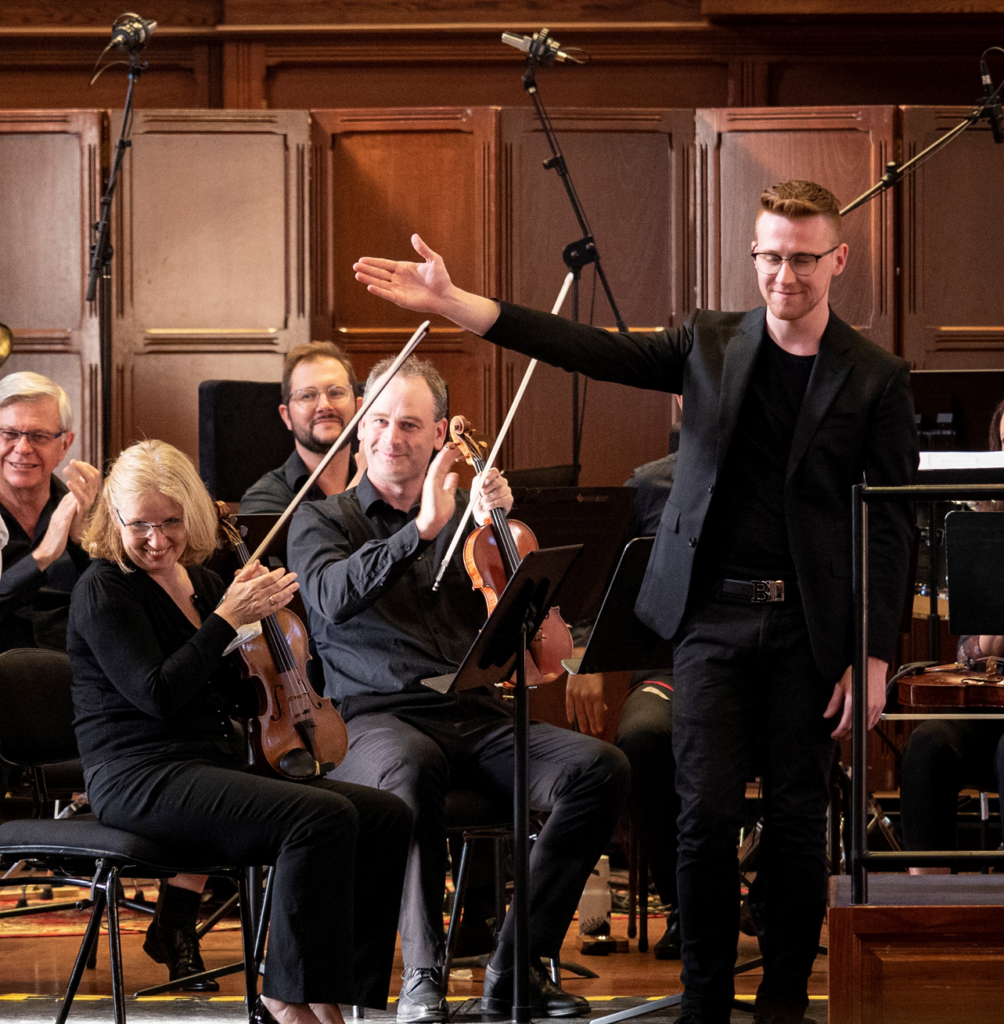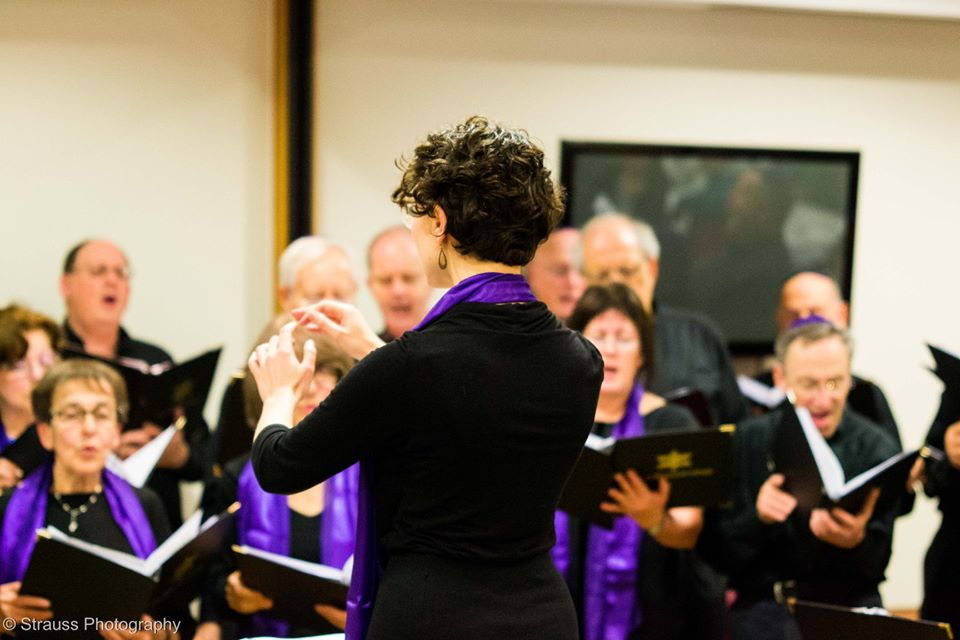
A Conducting Journey
Andrew Groch graduated from Elder Conservatorium’s Masters of Music Conducting course in 2019 and was Assistant Conductor at National Music Camp in 2019 and 2020. Words About Music participant Nicky Gluch is also an emerging conductor, and in this article the two discuss their simultaneous journeys from the classroom to the podium.

NICKY: Where did your musical life begin?
ANDREW: So I come from a reasonably musically naïve family but when I was at kinder age, my Mum put me into a music program. Maybe it was just because a few of her friends’ kids were doing it and she wanted an excuse to drop us somewhere and go and have coffee, but that’s how I began. In primary school I started learning piano, and then I picked up classical guitar and did a bit of electric guitar and jazz… Then, in Year 9, I was like, “hmm, I can’t really play in an orchestra,” so I picked up the flute.
At the start of Year 12, I still thought I was going to go off and do medicine or science, but something in me snapped, and so I decided to audition for flute at The University of Melbourne. I think, if I’m honest, that the end game of conducting was always in mind… I’d started conducting in about Year 10. I enjoyed being in a leadership position in the music department and it just kind of went naturally from there.
It was the same for me. I was asked to lead ensembles from Year 9, and when you are asked to do it, you don’t think about whether you should or shouldn’t. I fell for the score, as this amazing thing where you could see the secrets, the answers, of music. I’d never played piano, so I’d never done anything else that was simultaneous. That’s where the flute is limiting, because you can only play one part, but suddenly I had this opportunity to bring sounds together.
I think in the grand-scheme of the woodwinds, the flute has a lot more timbral and textural possibility than some of the other instruments but yes, when you’re used to a single-line instrument, the mind does explode when you suddenly go, “oh I can really shape something bigger than myself.”
What kind of influence did your own ensemble conductors have upon you?
The director of music at my high school was incredibly supportive and sort of opened up the whole [musical] world for me, because she attended a professional-development program with Graham Abbott and mentioned me to him. That’s how I ended up having lessons with him, which opened up a whole lot of doors.
Even just hearing him on air, Graham was a huge influence on me too. In the way he used to do Keys to Music, he made music come alive. The orchestra was a whole world. He’s part of the reason I wanted to go into radio, because I thought his way of bringing conducting and musicology together was very exciting.
So what did he teach you?
He taught me a lot of “down-the-line” technique. I remember looking at Stravinsky’s Les Noces; it has multiple piano parts, percussion, and a choir all singing in Russian. It’s a little bit bonkers! We would dive into that, looking at the joys of mixed-metre and how best to convey rhythmically complicated music, because that’s kind of the nuts and bolts of conducting.
Graham also taught me the style of thinking you need as a conductor. It’s not completely divorced from what you do as an instrumentalist; you’ve got to learn the piece, make sure your rhythm’s right, consider the harmony, and kind of build up these layers but then there’s also the “art” of what we do. It’s this sort of upper-layer of thinking which a solo instrumentalist would be aware of, but when you’re sitting in an orchestra, there’s a limit to how much of this you can do, because you only have your part.

It’s so different to theatre, where everyone is involved in the rehearsal process, shaping the play and breaking down the way the characters will interact. But you’re right because, in most circumstances, only the conductor really gets to do that. It’s a complex dynamic and that is why people talk about it being “an ego trip” or “a power game”. It’s what [camp conductor] Matt Coorey talks about, how he doesn’t want to see conducting that way. He wants to see it as a form of music-making: someone does have to be “in charge” in an orchestra, but conducting isn’t loftier than being an instrumentalist, it simply has its own requirements.
Yeah, and I think Mark Wigglesworth’s book title is the most apt description of that whole relationship: The Silent Musician. It’s like what our other conductor here at camp, Tzelaw Chan, was saying, how it’s kind of funny that after a concert everyone comes up to the conductor and says, “congratulations, that was such a great performance,” but you haven’t actually made any sounds.
I see conducting as facilitating. A conductor does need to come in with a point of view, because that’s what the orchestra wants; they want you to rehearse, fix the things that are wrong and have a point of view about music so that it says something, but it’s not like I’m out the front saying, “this is the only way that it can possibly go”. There’s a kind of silent conversation that happens. You have to go to a first read with an open mind about what the players are going to bring. The rehearsal process involves a lot of subtle, unspoken communication. You have to show that you’re willing to be collaborative, in a different way to what people might normally understand.
Coming, then, to Adelaide. What motivated you to come here, as opposed to other places, and do you think the course taught you these more psychological things?
I was definitely looking at other places to study. I had spent four years in Melbourne, where every musician’s mind seemed to be in Europe or America. I did, initially, think that maybe it was my time to go abroad but, having studied with Luke Dollman, I was aware of his course coming into existence. I applied, got in, and went: “Well, I’ve been handed this really great opportunity here, why risk going overseas, auditioning, not getting in, and then re-auditioning in Adelaide only not to get in there either?” The truth is, what makes a good conducting course are the opportunities provided outside the university.
Being in Adelaide has also given me the chance to assist at the AYO National Music Camp. This is my second year and it’s a fantastic opportunity.
What other aspects of your journey have shaped the way you go about music?
I think that a lot of my musical opinions are informed by other art forms and also by my politics and the context in which I live. I think we forget that music is art sometimes, I know that sounds really obvious but, in our industry, if you refer to an artist, it’s a technical term. My job at the ASO is ‘Artistic Coordinator’ which means I coordinate artists, i.e. soloists, conductors, people outside the orchestra.
But when everyone else refers to artists, they’re thinking of expressive, creative, beings. When people would say to me, “oh, you must be really creative/artistic,” I used to say, “ah, no, not really”. Then one day I went, “no, wait, that’s exactly what conducting is.” I think that great art reflects its context. I think you see that a lot more tangibly and directly in other art forms, partly because they’re less abstract. I mean they say… music is just ‘vibrating air’… in an age where classical music is, quite constantly, being interrogated for its value and its place in society, it has to really engage and say something about the world.

Yes, it’s fighting for its relevance. And as you say, visual art is more rapidly responsive. That’s why music has to reflect its context but also has to transcend it… that’s what Tzelaw liked about Sibelius 2. People have accepted the symphony as Finland’s ‘Symphony of Independence’ but because of the emotions it evokes it can be as relevant today.
Yes, if you think of Sibelius 2 or Sibelius 5, the endings of those are just so uplifting. These soaring, beautiful soundscapes are still relevant, but the relevance is in the context of our world. The reason they’re still so powerful is that they evoke hope and triumph over everything that’s wrong with the world right now.
So then the question conductors always get asked: Which composers inspire you or are you drawn to?
I don’t think there are a lot of composers I don’t like. Classical music is, admittedly, a very specialised thing, and to get everything out of it, you do have to engage with it quite deeply. I always find, absolutely, invariably, that once I’ve worked on a piece, or once I hear it live, I go, “yeah, I get it, there’s something special there”.
I agree, I think that’s a conductor’s privilege. Once I’ve worked on something, once I’ve dissected the score, I can’t dismiss it. You ultimately find something cool or intricate, that it says something. Each conductor has their own way of engaging with the composers, they become sort of like “friends”. In fact it might be disappointing if it were possible to meet them in real life, because we have these cerebral images of them.
That’s the thing with programming, because it’s so abstract. You have to create these narratives, otherwise it’s just one piece of music put next to another.
I understand you’re going to London. What are you looking for there, musically?
I’m going to expand my frame of reference. Classical music is a heritage art form and though there is a lot of excellent music that happens here, it’s hard to have a 100% convinced musical opinion when you’ve never heard the London Symphony Orchestra live, for example. And as I mentioned, hearing music live is truly its own experience… The sense of ritual of going to a concert, it just adds something else.
Also, Europe is just a bigger ecosystem and because of that, it can support a greater variety of things. And they can be more daring. People talk about all the weird and wonderful things happening in Germany, for example, I think that seeing that as well, seeing enough to inform my opinion…
You need to know what’s there, otherwise you’re always going to wonder.
Exactly, I don’t want to be making up ideas about what it is when I could just go over and see it and know it. Seeing the world and having an opinion on the world… if you want to have something significant to say, you want to be the most informed version of yourself you can be. After all, your job is standing in front of people and bringing them together into a singular vision. There’s got to be conviction, so rather than just seeing the four walls of a practice room, or only living in a single country – I think you’ve got to try and branch out.